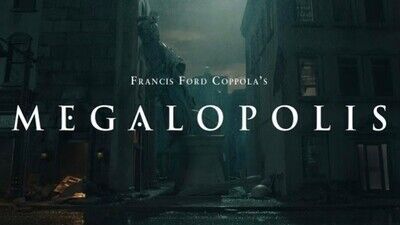It’s disgraceful, yes?
The Cannes Film Festival just announced that “Megalopolis” had been selected to play in competition this year, which is fantastic. But can you step it up a bit from here? Is that possible?
Remember that in 1979, Coppola had gotten thumped by the American media for spending so long shooting and editing his phantasmagoric Vietnam epic “Apocalypse Now,” and he showed an uncompleted cut at Cannes, and it jointly won the Palme d’Or along with “The Tin Drum,” and the momentum from that carried over to the theatrical release a few months later, translating into a surprisingly healthy box office, nominations and awards, and a cultural afterlife that continues to this very day?
Even if it doesn’t win in competition, could you maybe give it something? I mean, if only to shame our own entertainment industry for treating Coppola the way Orson Welles was treated in the 1960s and ‘70s, when he had to spend the money that he made by acting, plus whatever he raised by charming rich people, to finance low-budget movies in Europe, because nobody here would give him a dime?
Coppola is a giant of that magnitude. He won an Oscar for writing “Patton” and then went on to direct “The Godfather” and its sequels, plus “The Conversation” and “Apocalypse Now,” as well as “Bram Stoker’s Dracula,” “The Outsiders,” “Rumble Fish,” “Peggy Sue Got Married,” and a lot of other films that are fondly remembered and became widely seen even when they didn’t connect with audiences or critics in the states on first release. Even “One from the Heart,” his gobsmackingly obsessive 1982 Las Vegas musical shot entirely on sets, has started to find an audience, after basically bankrupting him, and has even proved influential on young filmmakers (“La La Land” and HBO’s “Euphoria” would not exist without it). He has often financed films with his own money, a thing that filmmakers are warned never to do. He’s a romantic that way.
And he did it again with the futuristic parable of governance “Megalopolis,” selling a chunk of his family’s wine business to finance it to the tune of $120 million. He’s got more courage in his pinky than most executives have in their whole bodies.
And now he can’t get anyone to distribute it in the United States.
Hollywood has always been known a place where the powers that be, the suits, The Man, whatever you want to call executives, didn’t truly understand the art of motion pictures, much less have the humility to embrace the number one rule of showbiz, which is “people don’t know what they want until you show it to them,” or, more succinctly, William Goldman’s maxim “Nobody knows anything.” It’s true that it’s not show friends, it’s show business. But until fairly recently, you could bet your house on the certainty that the executive suite at a Hollywood studio would include a fair number of people who liked movies, or pretended to, at least on general principle, and perhaps even had seen enough of them to be able to fake their way through a five-minute conversation with a famous director they wanted to sign, and had at least a vague sense that you can’t grow an industry and create new moviegoers by endlessly repurposing the same old “Intellectual Property” (what a dreary phrase). That, at some point, you have to try something new, something different.

